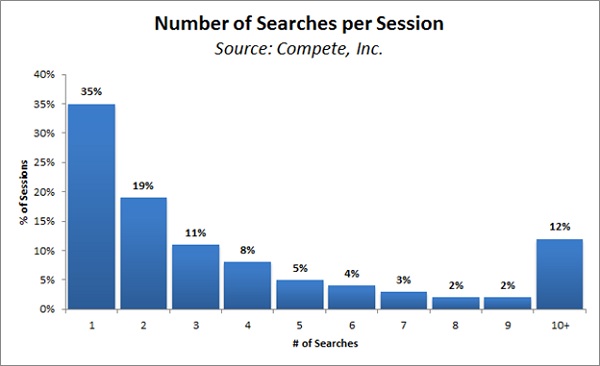Ask many search marketers what their number one goal is and they’ll probably tell you it’s to appear in the top position on the first search engine results page (SERP). This is understandable.
We all know that consumers, more often than not, will click on the top ad above or to the right of the organic results. For the advertiser, that means a better click-through rate (CTR), more site traffic (often at a lower cost per click), and presumably more sales.
However, search marketers should also be mindful that a consumer clicking on the first ad he or she sees doesn’t constitute the totality of shopping behavior on the search engines.
In fact, it’s rarely a “one and done” situation.
When users visit a search engine, they conduct multiple searches nearly 65 percent of the time, according to a study by Compete. What’s more, three or more searches were conducted in nearly half of all sessions and 12 percent of sessions included a whopping 10 or more searches.

What Are Search Refinements?
This should probably come as no surprise considering the high number of “touches” many online shoppers make before eventually settling on a purchase.
The key takeaway for search marketers is that single phrases are rarely typed into a search engine in isolation; it’s far more common for searchers to enter multiple phrases in rapid succession, building on each preceding one, until they find what they seek.
These subsequent phrases are known as “search refinements.”
As an example, I recently sat down with a friend who was searching Google for a used Mercedes Benz SUV. His initial search term was “Mercedes,” quickly followed by “Mercedes-Benz,” “Mercedes Benz M-class,” “Mercedes Benz M-class used” and finally “2012 Mercedes Benz M-class used”.
Will Appearing in Search Refinements Increase CTR?
Although my friend didn’t find what he was looking for (more on that later), he did end up clicking on the ad of a local dealer whose ads appeared on the SERP for four of his five searches.
This behavior raises an important question: are searchers more likely to click an advertiser who appears on each subsequent search?
To find out, I conducted a study analyzing estimated CTRs for 268 advertisers who consistently appeared on subsequent search refinements (for instance, “oven reviews” and “convection oven reviews”).
The Results: A 47% Lift in CTR
Users were indeed more likely to click on advertisers that appeared more often in the same session.
Specifically, the study showed that an advertiser who appears at least 10 percent of the time for both the initial query and the follow-up query received an average lift of 47 percent of their initial CTR on the subsequent search.
As an example, take an advertiser who received a CTR of 1.0 percent on the term “Venetian Hotel.” That same advertiser appearing on the search refinement, “Venetian Hotel Vegas,” would be expected to experience a “CTR bonus” of .47 percent relative to other advertisers, because he appeared on both terms.
Of course, the impact of repeated impressions may not be the only factor that results in a bump in CTR.
Undoubtedly, advertisers who are more thorough in targeting search refinements also tend to be more rigorous in their approach to ad copy and landing page design. After all, the best advertisers go to great lengths to ensure their campaigns respond to searchers’ intent and deliver a relevant experience.
Consider Search Refinements When Creating Your Campaign
Search refinements are incredibly underappreciated. While many advertisers focus heavily on initial keyword expansion and ad copy optimization, relatively few think about the impact their ads might have when seen in rapid succession.
Search marketers should consider not only the keywords they target, but also the sequence in which those keywords may be entered as users refine their initial searches.
By ensuring high coverage and relevant ads across the entire chain of search refinements, you not only can increase your CTR on the initial search phrase, but also on longer, more specific phrases as well.
A Word of Warning
Make sure your landing page delivers on what was promised in the ad, and that it does so in a way that is user-friendly for the consumer.
In the case of my friend shopping for a Mercedes SUV, his click on the dealer’s ad landed him on a complicated inventory search page that included nine search fields and required his personal contact information, including phone number, just to see what vehicles they had in stock. He ended up abandoning the dealer site, and his search session, and ultimately purchased a $63,000 vehicle from another dealer just a few weeks later.
Few things in paid search are more tragic than spending considerable time and money optimizing high-traffic terms only to lose your prospects just before the sale.
